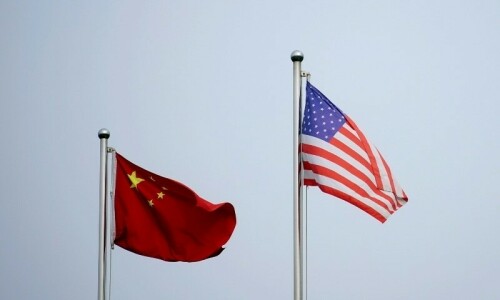PAKISTAN’S assurance to the International Monetary Fund that it would grant the ‘most favoured nation’ status to India may appear unconvincing if one looks at Islamabad’s past dithering on the matter.
Only a month ago, the finance minister had said that the matter of awarding MFN status to India was not on the table at the moment, as Pakistan’s ‘own interests’ had to be defended first.
His remarks, made in a TV interview, were followed by a strong persuasive note by the World Bank, which asked Pakistan to give the MFN status to its neighbour. In 2012, Pakistan had committed itself to giving the MFN status to India, and having done all the necessary spadework in this regard, opted to miss its own deadline of December 31, owing to domestic opposition and reciprocal response from new Delhi.
The fact remains that it is not Pakistan, but India, which is to be blamed for the delay in the normalisation of trade relations, for it persistently avoids undertaking measures for removing tariff and non-tariff barriers on imports of Pakistani goods.
India also failed to implement certain mutually agreed measures. The two sides had agreed to carry out some facilitation measures, such as agreements on visa, removal of trade grievances — including those related to certification, licensing, lab testing, and mutual recognition of standards — and customs cooperation.
The presence of barriers was unacceptable to Pakistan’s industry, as it negated the objective of free trade. In the absence of a reciprocal Indian response, Islamabad was left with the only option: deferring the granting of the MFN status to India.
Unless the concerns of industries such as textiles, auto parts, pharmaceuticals and agriculture are satisfied, there is every likelihood that the whole process would be put off for a longer period.
One may note that India’s stubborn attitude has not been much highlighted by the media in both countries. What was more highlighted was the fact that India had granted MFN status to Pakistan in 1996, but the latter has so far failed to reciprocate. Regardless, this status has been more a formality, as Pakistan suffers from an unfavourable balance of trade with India.
It was on November 3, 2011, that Pakistan finally decided to go ahead with normalisation of trade with India and according it the MFN status.
Trade ties, however, cannot be independent of political ties. At a time when violations on the Line of Control have caused tensions in bilateral relations, any progress in trade relations is not possible. It was in the backdrop of this development that Finance Minister Ishaq Dar said last month that the granting of MFN status to India was not under ‘immediate consideration’ because what was urgently needed was normalisation of relations and consensus ‘on a number of issues’.
The Memorandum of Economic and Financial Policies (MEFP), submitted by Mr Dar to the IMF, spells out major contours of the trade policy, with a stress on normalisation of trade relations.
After Pakistan and India resumed dialogue on peace and normalisation, trade was the only area where the two countries were able to make progress.
The previous government had decided in March last year to switch over from a positive list of about 1,900 tradable items to a negative list of about 1,206 items, thereby allowing about 5,000 items to be traded between the two countries. And the negative list would also be phased out once India gets the MFN status.
“We are moving forward with eliminating the negative list on trade with India and shifting to a ‘sensitive list’ under the South Asia Free Trade Arrangement (Safta) regime to facilitate increased regional trade,” said Mr Dar in the TV interview. A large number of automobile, textile and pharmaceutical products dominate the negative list.
The 293-page ‘Pakistan, the Transformative Path’ document, released by the World Bank on August 20, recommends 12 urgent reforms for the PML-N government. These include the MFN status for India, and the import of electricity from that country.
The document contains a pro-India tilt, and says that the MFN status would help Pakistan benefit quickly from the fast growth and large markets of its bigger neighbour. Pakistan, it observes, ‘is the key missing market for India’.
Ignoring the tensions on the Line of Control, which have created an anti-India sentiment in the country — with no tangible progress in trade possible in such times — the World Bank continues to suggest to Islamabad that ‘the growth-enhancing dynamics’, that the normalisation process with India would unleash, would help attract foreign direct investment in information technology, manufacturing, services and power projects.
The Bank insists that a power transmission link with India could be implemented in the next 6–12 months, with a potential capacity of 1,000 megawatts. However, according to local experts, the laying of transmission lines between the two countries would take at least two to three years.
Regarding the protection of vulnerable sectors of industry, their leaders say they were assured by the previous government that if India failed to remove trade barriers, the negative list would not be abolished. Makhdoom Amin Fahim, the then-Commerce Minister, had told the National Assembly’s standing committee on commerce on November 8 that whenever the negative list was abolished, the government would still be ‘putting in place safety valves’ to safeguard its industries.
But farmers, mostly landowners, have been more vocal and aggressive in seeking a level-playing field in the trading of agricultural products. Their representatives say that the government should either give Rs12,000 per acre in subsidy to growers on various inputs, or agricultural imports from India should be subjected to a duty to the tune of subsidies being given by the Indian government to its farmers.














































Dear visitor, the comments section is undergoing an overhaul and will return soon.